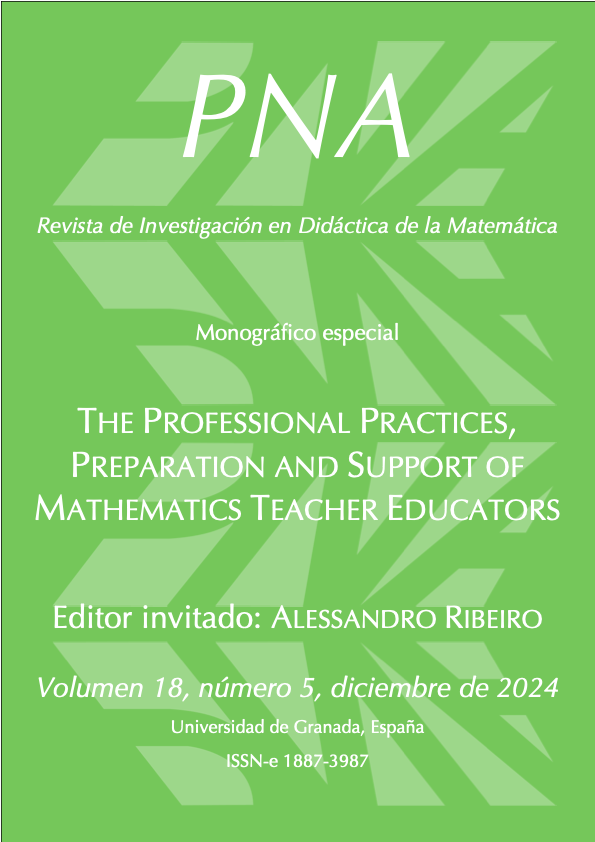El modelo MTSK como soporte de crecimiento profesional del formador
DOI:
https://doi.org/10.30827/pna.v18i5.29828Palabras clave:
Aprendizaje, Crecimiento profesional, Formador de profesores, Matemáticas, MTSKResumen
En este artículo pretendemos describir aspectos que den cuenta del MTSK como soporte en el crecimiento profesional del formador de profesores. Abordamos un estudio de caso constituido por una formadora de futuros profesores de primaria. La recogida de información la realizamos a través de cuestionarios. Los resultados principales de crecimiento profesional están dados en términos de dominios personales, externos, de práctica y de consecuencia. El uso y fortalecimiento del MTSK puede fomentar crecimiento profesional en el formador de profesores, se puede lograr que haya aprendizaje, cambios continuos y duraderos respecto a mejorar la práctica como formador de profesores.
Descargas
Citas
Abell, S., Rogers, M., Hanuscin, D. L., Lee, M., y Gagnon, M. (2009). Preparing the next generation of science teacher educators: A model for developing PCK for teaching. Journal of Science Teacher Education, 20(1), 77-93. https://doi.org/10.1007/s10972-008-9115-6 DOI: https://doi.org/10.1007/s10972-008-9115-6
Berry, A. (2007). Tensions in Teaching about Teaching. Developing Practice as a Teacher Educator. Springer. DOI: https://doi.org/10.1007/1-4020-5993-0
Berry, A. (2016). Teacher educators’ professional learning: A necessary case of ‘on your own’? En B. De Wever, B. R. Vanderlinde, M. Tuytens y A. Aelterman (Eds.), Professional learning in education: Challenges for teacher educators, teachers and student teachers (pp. 39-56). Ginko Press y Academia Press.
Beswick, K. (2020). Mathematics teacher educators as developing professionals. Un introduction. En K. Beswick y O. Chapman (Eds.), International handbook of mathematics teacher education (Vol. 4): The mathematics teacher educator as a developing professional (pp. 1-11). Brill Sense. DOI: https://doi.org/10.1163/9789004424210_001
Carrillo J., Climent, N., Montes, M., Contreras, L.C., Flores-Medrano, E., Escudero-Ávila, D., Vasco, D., Rojas, N., Flores, P., Aguilar-González, Ribeiro, M., y Muñoz-Catalán, M. (2018). The mathematics teacher’s specialised knowledge (MTSK) model. Research in Mathematics Education, 20(3), 236-253. https://doi.org/10.1080/14794802.2018.1479981 DOI: https://doi.org/10.1080/14794802.2018.1479981
Chapman, O. (2008). Mathematics teacher educators’ learning from research on their instructional practices. En B. Jaworski y T. Wood (Eds.), International handbook of mathematics teacher education (Vol. 4): The mathematics teacher educator as a developing professional (pp. 110-129). Sense publishers.
Clarke, D. y Hollingsworth, H. (2002). Elaborating a model of teacher professional growth. Teaching and Teacher Education, 18, 947-967. DOI: https://doi.org/10.1016/S0742-051X(02)00053-7
Cochran-Smith, M., y Villegas, A. M. (2015). Framing Teacher Preparation Research: An Overview of the Field, Part 1. Journal of Teacher Education 66(1), 7-20. https://doi.org/10.1177/0022487114549072 DOI: https://doi.org/10.1177/0022487114549072
Czerniawski G., MacPhail A. y Guberman A. (2017). The professional development needs of higher education-based teacher educators: an international comparative needs analysis. European Journal of Teacher Education, 40(1), 127-140. https://doi.org/10.1080/02619768.2016.1246528 DOI: https://doi.org/10.1080/02619768.2016.1246528
European Commission (2012). Supporting the Teaching Professions for Better Learning Outcomes. European Commission. https://eur-lex.europa.eu/LexUriServ/LexUriServ.do?uri=SWD:2012:0374:FIN:EN:PDF
Furlong, J., Barton, L., Miles, S., Whiting, C. y Whitty, G. (2000). Teacher Education in Transition: Re-forming Professionalism? Open University Press.
Goodwin, A. L. y Kosnik, C. (2013). Quality Teacher Educators = Quality Teachers? Conceptualizing Essential Domains of Knowledge for Those Who Teach Teachers. Teacher Development 17(3), 334-346. https://doi.org/10.1080/13664530.2013.813766 DOI: https://doi.org/10.1080/13664530.2013.813766
Goos, M. y Beswick, K. (2021). Introduction: The learning and development of mathematics teacher educators. En M. Goos, y K. Beswick (Eds.), The learning and development of mathematics teacher educators. Research in Mathematics Education (pp. 1-20). Springer. https://doi.org/10.1007/978-3-030-62408-8_1 DOI: https://doi.org/10.1007/978-3-030-62408-8_1
Jaworski, B. (2008). Development of mathematics teacher educators and its relation to teaching development. En B. Jaworski y T. Wood (Eds.). International handbook of mathematics teacher education (Vol 4). The mathematics teacher educator as a developing professional (pp. 335-361). Sense Publishers. DOI: https://doi.org/10.1163/9789087905521
Kelchtermans, G., Smith, K. y Vanderlinde, R. (2017). Towards an ‘International Forum for Teacher Educator Development’: An Agenda for Research and Action. European Journal of Teacher Education, 41(1), 120-134. https://doi.org/10.1080/02619768.2017.1372743 DOI: https://doi.org/10.1080/02619768.2017.1372743
Livingston, K. (2014). Teacher Educators: Hidden Professionals. European Journal of Education 49(2), 218-232. https://doi.org/10.1111/ejed.12074 DOI: https://doi.org/10.1111/ejed.12074
Llinares, S. y Krainer, K. (2006). Mathematics (student) teachers and teacher educators as learners. En A. Gutierrez y P. Boero (Eds.), Handbook of research on the psychology of mathematics education: Past, present and future (pp. 429-459). Sense Publishers. DOI: https://doi.org/10.1163/9789087901127_016
Lunenberg, M., Dengerink, J. y Korthagen, F. (2014). The Professional Teacher Educator. Sense Publishers. https://doi.org/10.1007/978-94-6209-518-2 DOI: https://doi.org/10.1007/978-94-6209-518-2
Murray, J. y Male, T. (2005). Becoming a teacher educator: Evidence from the field. Teaching and Teacher Education, 21(2), 125-142. https://doi.org/10.1016/j.tate.2004.12.006 DOI: https://doi.org/10.1016/j.tate.2004.12.006
Rodríguez, G., Gil, J. y García, E. (1996). Metodología de la investigación cualitativa. Ediciones Aljibe.
Scheiner, T., Montes, M. A., Godino, J. D., Carrillo, J. y Pino-Fan, L. R. (2019). What makes mathematics teacher knowledge specialized? Offering alternative views. International Journal of Science and Mathematics Education, 17, 153-172. https://doi.org/10.1007/s10763-017-9859-6 DOI: https://doi.org/10.1007/s10763-017-9859-6
Smith, K. (2011). Professional Development of Teacher Educators. En P. Peterson, E. Baker y B. McGaw (Eds.), International Encyclopedia of Education (3ª ed., pp. 681-688). Elsevier. DOI: https://doi.org/10.1016/B978-0-08-044894-7.00675-8
Stake, R. E. (1999). Investigación con estudios de casos. Morata.
Swennen, A., Jones, K. y Volman, M. (2010). Teacher educators: Their identities, sub- identities and implications for professional development. Professional Development in Education, 36(1-2), 131-148. https://doi.org/10.1080/19415250903457893 DOI: https://doi.org/10.1080/19415250903457893
Vanassche, E. (2014). (Re)constructing teacher educators’ professionalism: Biography, workplace and pedagogy [Tesis doctoral, Universidad Católica de Leuven, Bélgica]. https://lirias.kuleuven.be/retrieve/274279
Vanderlinde, R., Bain, Y., Lunenberg, M., Meijer, P., Murray, J., O’Sullivan, M., Smith, K., Tack, H. y Walraven, A. (2018). Learning and Design Principles for Teacher Educators’ Professional Development. https://info-ted.eu/wp-content/uploads/2018/05/Output-supportive-guidelines-InFo-TED.pdf
Zaslavsky, O., y Leikin, R. (2004). Professional development of mathematics teacher educators: Growth through practice. Journal of Mathematics Teacher Education, 7(1), 5-32. DOI: https://doi.org/10.1023/B:JMTE.0000009971.13834.e1
Zakaryan, D. y Sosa, L. (2021). Conocimiento del profesor de secundaria de la práctica matemática en clases de geometría. Educación Matemática, 33(1), 71-97. https://doi.org/10.24844/EM3301.03 DOI: https://doi.org/10.24844/EM3301.03
Zeichner, K. M. (1999). The New Scholarship in Teacher Education. Educational Researcher, 28, 4-15. DOI: https://doi.org/10.3102/0013189X028009004
Descargas
Publicado
Número
Sección
Licencia
Derechos de autor 2024 PNA. Revista de Investigación en Didáctica de la Matemática

Esta obra está bajo una licencia internacional Creative Commons Atribución-NoComercial-SinDerivadas 4.0.



















